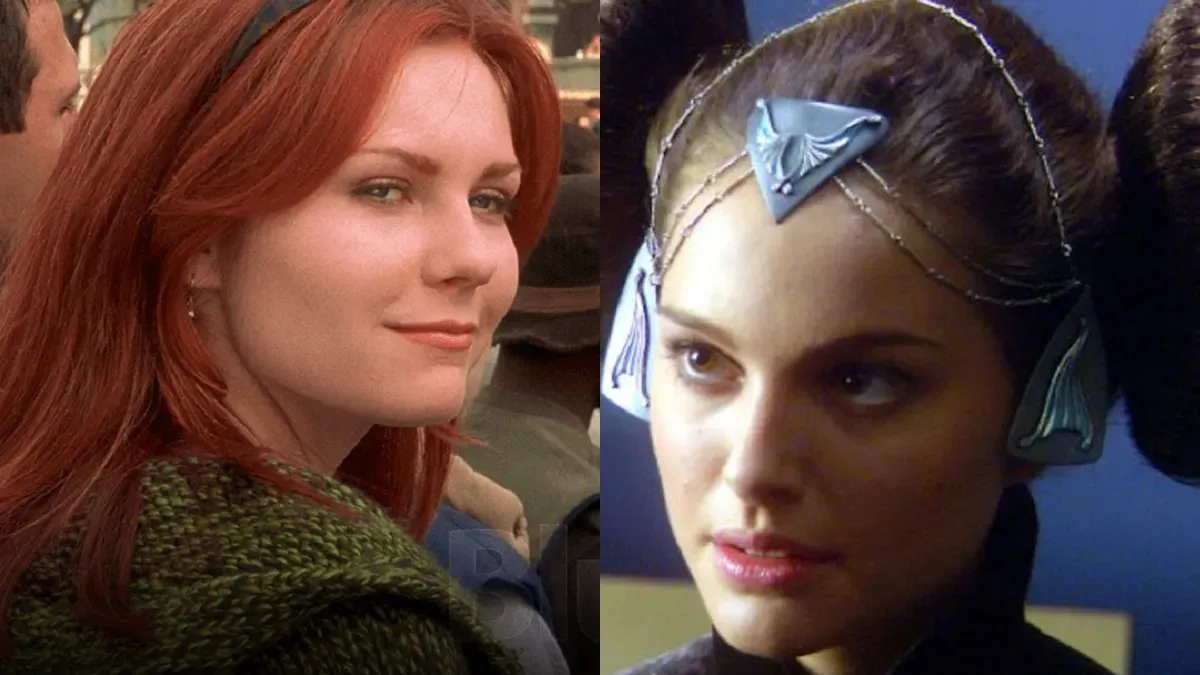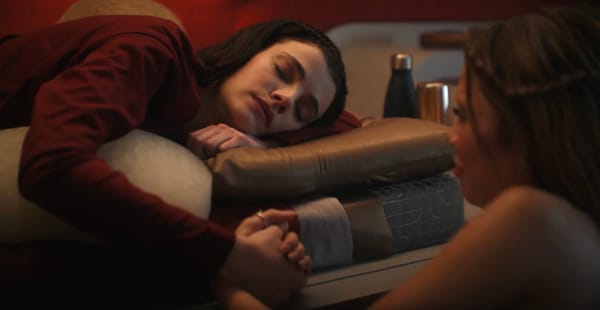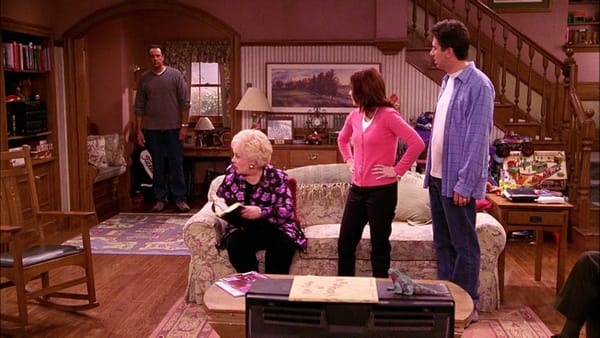Introducing Kirsten and Natalie
A new occasional series, coming soon

When I was young, I held girlhood at arm's length. Every time I hung out with girls around my age or went over for playdates with them, I could feel something inside of me that was being actively suppressed. But I also didn't acknowledge that it was there. It wasn't safe to do so.
The safest way to have a phantom girlhood, then, was to pursue it through fiction. I remember the fascination I felt when a teacher read us Francis Hodgson Burnett's A Little Princess, and I felt certain its depiction of a young girl in hiding, the world persecuting her for not understanding her truth, was the most relatable character ever. And I similarly latched on to girl characters in books it was considered "okay" for boys to read (especially Ramona Quimby) and in books where the boy was supposed to be the focus (ah how I longed to be Eilonwy from Lloyd Alexander's Prydain Chronicles).
But as I got older, books weren't the only source of a girlhood I could imagine and project back onto myself. I grew up in an era when there were a surprising number of girls who were roughly my age who had highly successful acting careers. The first of these actors whose work I grew to adore was Sarah Polley, who played Ramona herself in the Canadian TV series that was broadcast on PBS in the US. (Brief pause to note that I, alas, have always been a Beezus. Such is my curse.)
Later, I faithfully watched every single episode of the series Avonlea (Road to Avonlea basically everywhere but the US), because my mother liked that show and because Polley was the lead of the series. She was a small blonde girl with blue eyes and a severe demeanor. The rest of the world was comparing me to Macaulay Culkin (the curse of the AMAB child born between 1980 and 1985!); I really would have preferred the Polley comparisons.
(I want to also briefly nod to Kellie Martin as Becca in Life Goes On here, because her entire aesthetic in that show is absolutely what my look would have been in, like, seventh grade, and she was just enough older than me that my fourth-grade brain could think she was the coolest person alive.)
But right as I started to lurch toward puberty — and the slow, dawning realization that the puberty I was going to go through was going to be deeply unsettling and horrible and wrong — two actors became household names, despite being young teens themselves. One of them would become such a favorite of mine that I would see everything she did; the other would leave me a little cold, though I now can see what a talent she was and is and will continue to be.
I speak, of course, of Kirsten Dunst and Natalie Portman.
Dunst was the actor I adored, and, again, she was a blue-eyed blonde girl, but this time, she had a slightly sadistic streak to her, one that she has maintained throughout her career. I first became aware of her as a performer thanks to her work in Interview With the Vampire, a film I wasn't allowed to see (and still haven't seen) but a film for which she garnered rave reviews. Because of those reviews, she got write-ups in various magazines and other publications, and she even made People's Most Beautiful list in 1995, in an issue dated just eight days after her 13th birthday. (The '90s were creepy!)

My first encounter with her actual work was Gillian Armstrong's 1994 adaptation of Little Women (still my favorite film of that book). She plays the younger Amy in that film, and she's appropriately bratty. I loved her performance, and I know that my entire family was convinced I had an early crush on her. Maybe I did, but some other part of me knew she was the kind of famous person whose adventures onscreen could parallel that phantom girlhood I wasn't having.
I wasn't as familiar with Natalie Portman. I saw a couple of the films she made as an older teen, and I certainly saw the Star Wars prequels. But her early films tended to be more adult-oriented, and they often positioned her as, in essence, a child worth lusting over. (AGAIN, THE '90S WERE CREEPY.) It took me much longer to warm to Portman, an actor I found overly mannered and hard to take for a long, long time until I was weirdly blown away by her work in V for Vendetta. While Dunst fell into a fallow period in the late 2000s, Portman started turning out some of the best work of her career.
And I was still... well, I was making a go of being a man. But I always felt a vague affinity for Dunst and Portman, even when I didn't like their movies, because they were right there, living fictional lives I could have lived, had a couple of things gone differently. (If I had been born a cis girl, for instance, or if I had met a spider-man as a teenager.)
I think a lot about how trans people learn to see ourselves onscreen when we can't see ourselves in ourselves, and the more I've thought about it, the more I've realized that Kirsten Dunst and Natalie Portman offered that kind of seeing for me. Seeing a movie starring them felt a little like getting a peek through a window into a world where everything made just a little bit more sense.

But to look at the careers of these two highly accomplished women (Portman has an Oscar; Dunst seems likely to be nominated for her work in Power of the Dog this year) is to also see all of the ways that our culture tends to pigeonhole and sideline women, even when they are supposedly in the prime of their lives. Both Dunst and Portman broke out with movies in which they were presented as attractive children, and as they aged, the leering camera aged right along with them. What lessons was I accidentally internalizing about being a woman in the US from watching these women in these movies? And what can I learn about myself from revisiting those movies today? I'd love to find out.
So infrequently, over the next few months, at my leisure, I'm going to be pairing Kirsten Dunst and Natalie Portman movies that have a rough thematic link (Phantom Menace and Spider-man, for instance) or that happened right around the same time in both women's careers. I'm going to be looking at them as performers, yes, and the films as films, sure, but also at how these actors speak to the phantom girlhood I was having via fictional proxies. I won't be publishing a new installment of this every week, because I would quickly destroy myself. But I will be trying to average one per month.
We'll start next week (hopefully) when I take a look at both women's breakout films, both from 1994: Leon: The Professional, starring Portman, and Interview with the Vampire, starring Dunst. And, yes, they're both movies about how the actors' characters are very attractive children. Which should be something, at least!
Subscribe now, everybody!
Talk back to me: Got any hot takes on Kirsten Dunst and Natalie Portman? Have any movies I absolutely have to see starring the two of them? Are you quietly psyched for the inevitable article comparing Black Swan and Melancholia? Because I am!
What I've been up to: This week at Vox, I wrote about the excellent new Kacey Musgraves album star-crossed, and I got #YellowPilled by watching all three seasons of Yellowstone and writing about how it's a red-state version of Succession.
First things first: Yellowstone, which was created by screenwriter Taylor Sheridan (Hell or High Water, Sicario, Wind River) and John Linson (whose only writing credit ever is the Yellowstone pilot), is not about Yellowstone National Park. It’s set near the park, and sometimes characters go there to have symbolically fraught encounters with wolves. But most of the action revolves around the Yellowstone Dutton Ranch in Montana. Within the fiction of the show, the ranch is the largest contiguous ranch in the United States, and it has made the Dutton family that owns it very rich.
What you missed if you're not a subscriber to Episodes: The Cowboy Bebop recaps had to wait another week, because I'm just not there yet in terms of my recovery. But they'll hopefully be around soon enough. In the meantime, Ciara Moloney took a look at the wonders of the Soviet adaptation of Sherlock Holmes, and I really want to check this show out!
Contemporary television feels like an endless tide of hot new thing after hotter newer thing. I find the faux-urgency of it genuinely stressful. Now, I love television, but I hate obligations, so I find myself retreating into the medium’s past, to shows which, pending an ill-advised reboot or two, don’t feel like they come with a deadline. And very little comes with less of a deadline than a Soviet adaptation of Sherlock Holmes from the 1970s and ‘80s.
Read me: Author Fonda Lee encountered angry blowback on Twitter, and she wrote one of the most succinct explanations of why the social media platform is so easily manipulated by bad actors that I've read. The following paragraph, in particular, is great, but the whole thing is worth reading.
Twitter removes the trust between writer and reader by flattening meaning to the single most offensive understanding and proliferating that version alone. I realized after the furor over my Dune tweet that I had instinctively told a story in my allotted 280 characters. My tweet reads, “Here is a thing that you’re not supposed to do,” and then I went ahead and did it. It’s a classic writer’s trick, a sleight of hand with prose, a plot twist on a sentence level. The very skill that we writers work to cultivate — conveying even the smallest thought with a maximum of style — puts us at risk of being interpreted in one ungenerous way that cannot be argued, corrected, or withdrawn, only filtered through increasingly determined cycles of confirmation basis until it becomes truth.
Watch me: I am so hyped for the new Showtime series Yellowjackets, and the first episode of the show is available on YouTube now! It's pretty gross!!
And another thing... I dunno. I just miss Secretariat.
Opening credits sequence of the week: God, I love Aaron Spelling opening credits sequences. This one, especially, is great, because the theme song just repeats the name of the show (Aloha, Paradise) over and over, and because it features a child credited solely as "Louanne."
What I had to look up: I did a really deep dive on the People Most Beautiful issue from 1995, and let me tell you, that was really a time to be alive in America. Tyson Beckford and John Grisham? Hotness was sweeping the nation!
This week's reading music: "Where the Time Went" by Ex:Re with 12 Ensemble
Episodes is published three times per week. Mondays feature my thoughts on assorted topics. Wednesdays offer pop culture thoughts from freelance writers. Fridays are TV recaps written by myself. The Wednesday and Friday editions are only available to subscribers. Suggest topics for future installments via email or on Twitter. Read more of my work at Vox.




